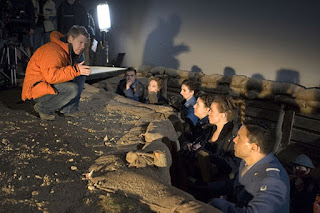 Branagh’s Magic Flute independently financed by The Peter Moore Foundation was completed in 2006, played in a few festivals, was released overseas but received no US distribution. Nor was there a US DVD or cable deal. I found this strange in light of Branagh’s celebrity and even more so in light of his helming of the $180+ million domestic box office grossing Thor for Marvel in 2011 and his upcoming re-launch of the Tom Clancy Jack Ryan series for Paramount.
Branagh’s Magic Flute independently financed by The Peter Moore Foundation was completed in 2006, played in a few festivals, was released overseas but received no US distribution. Nor was there a US DVD or cable deal. I found this strange in light of Branagh’s celebrity and even more so in light of his helming of the $180+ million domestic box office grossing Thor for Marvel in 2011 and his upcoming re-launch of the Tom Clancy Jack Ryan series for Paramount.
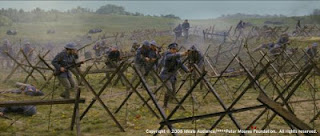 Elizabeth- As the Magic Flute opens, we are in the middle of a battlefield. Trenches and barbed wire surround fields as men climb out of trenches to attack the enemy. So far so good. I was excited at the prospect of a Magic Flute set in a certain period…but then they seemed to lose the thread, at least for me.
Elizabeth- As the Magic Flute opens, we are in the middle of a battlefield. Trenches and barbed wire surround fields as men climb out of trenches to attack the enemy. So far so good. I was excited at the prospect of a Magic Flute set in a certain period…but then they seemed to lose the thread, at least for me.
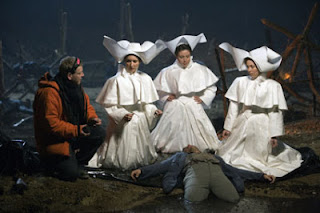 Also, the way it was set up, I thought the whole movie was going to be a dream Tamino was having. Especially given the surreal dream-like scenarios later in the movie with Papageno and his Technicolor fields and flirty bird girls.
Also, the way it was set up, I thought the whole movie was going to be a dream Tamino was having. Especially given the surreal dream-like scenarios later in the movie with Papageno and his Technicolor fields and flirty bird girls.
Shawn- The small older crowd in the Chelsea theatre needed help with the ticket printing machines. The young usher, with “The Lone Ranger” printed on his red shirt, seemed to enjoy saying, “We’re not letting in for the opera yet.” As he said it at least four times in the exact same way. It sounded both foreign and excited and may have been the first time the word opera had ever been on his lips. That and the general enthusiasm of the older crowd waiting to get in got me excited as well. I was still confused by the complex details of the distribution deal and lack of previous release in the US. Especially as “From the director of Thor” is prominently listed at the top of The Magic Flute one sheet. If the nearly half a billion dollar worldwide grosses of Thor were not enough to get the film even a DVD release in this country what could be wrong with it?
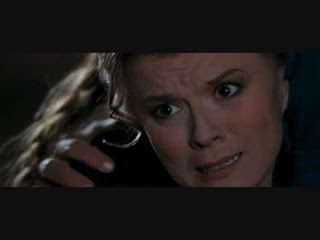 Nothing particularly, although I found it a very mixed bag. The first third worked very well. The use of tendrils of mustard gas to represent the snake was great, for example, and gave me great hope for the rest of the film. But then the locations and set failed to expand to fully meet the, albeit bizarre, needs of the story. The Trials of Water and Fire felt inflicted on the film as opposed to part of the narrative. The 27-35 million dollar budget was supplied by The Peter Moore foundation but even at that none too shabby level the limitations of the budget can be felt. The CGI feels especially flat. Although CGI in an opera movie is a good innovation. Magic Flute could lend itself especially to this. The sets too are too static with the same ill defined castle interior used for a variety of sequences. The locations and set feel too small, the CGI too large and flat. They don’t gel. I did enjoy some aspects of the setting however. The Queen of the Night’s first appearance riding a tank out of the fog, for example.
Nothing particularly, although I found it a very mixed bag. The first third worked very well. The use of tendrils of mustard gas to represent the snake was great, for example, and gave me great hope for the rest of the film. But then the locations and set failed to expand to fully meet the, albeit bizarre, needs of the story. The Trials of Water and Fire felt inflicted on the film as opposed to part of the narrative. The 27-35 million dollar budget was supplied by The Peter Moore foundation but even at that none too shabby level the limitations of the budget can be felt. The CGI feels especially flat. Although CGI in an opera movie is a good innovation. Magic Flute could lend itself especially to this. The sets too are too static with the same ill defined castle interior used for a variety of sequences. The locations and set feel too small, the CGI too large and flat. They don’t gel. I did enjoy some aspects of the setting however. The Queen of the Night’s first appearance riding a tank out of the fog, for example. 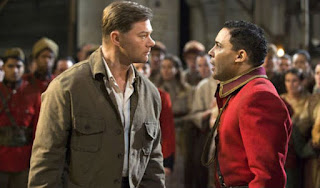 And the majority of performances were strong. Rene Pape particularly is striking both vocally and physically onscreen. He could have a second career as a Bond villain I think. Lyubov Petrova as the Queen of the Night has a harder time and is not served by Branagh’s extreme close ups of her mouth during the more difficult vocal passages. I also found myself wondering why Branagh didn’t get Diana Damrau for the Queen of the Night, as she is the current reigning queen of the Queens.
And the majority of performances were strong. Rene Pape particularly is striking both vocally and physically onscreen. He could have a second career as a Bond villain I think. Lyubov Petrova as the Queen of the Night has a harder time and is not served by Branagh’s extreme close ups of her mouth during the more difficult vocal passages. I also found myself wondering why Branagh didn’t get Diana Damrau for the Queen of the Night, as she is the current reigning queen of the Queens.
Related Articles:
How Hollywood Films Are Killing Opera?!?
The Bohemians in Brooklyn: A Modern La Boheme Film
Carl Jung, BDSM and The Flavored Popcorn Dilemma
The Hunchback of the Casino: Rigoletto at the Metropolitan Opera

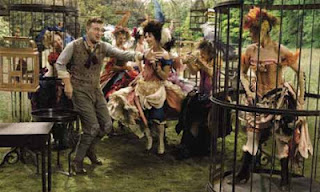
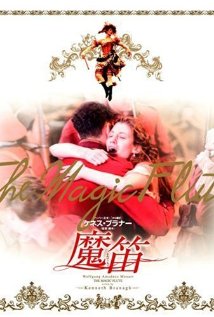


I’m just in love with your blog! Seriously! 🙂
Have you ever considered opera from the French perspective? I recommend this:
http://happinessdishbestsavouredhot.blogspot.ca/
Thank you! And thank you for reading!
Will check it out. 🙂